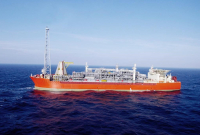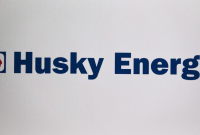Support strong Canadian climate journalism for 2025
The premiers of two oil-producing provinces called on the Senate to force the Trudeau government’s new environmental assessment regime to take into account the economic benefits of fossil fuel projects.
Alberta Premier Rachel Notley and Newfoundland and Labrador Premier Dwight Ball appeared before the Senate energy committee Feb. 28 to argue that Bill C-69, the Trudeau’s government’s attempt to modernize the assessment process so that it better takes into account climate change, would hinder oil and gas development.
Environmentalists and economists question how many long-term, stable fossil fuel jobs are in Canada's future, given a global investment shift towards energy sources that don't pollute the atmosphere and lead to global warming.
Alberta sits on the world's third-largest oil reserves after Saudi Arabia and Venezuela, and produces four-fifths of Canada’s crude. The Notley government has become frustrated that it cannot ship the ever-greater amounts of crude its industry is making available for export, an amount that has more than doubled since 2010.
“We can’t swap one broken system for another broken system. We can’t build trust with more investor uncertainty. We can’t replace a no-pipeline process under the former Conservative government, with a no-pipeline process under a Liberal one,” said Notley.
“But it seems either by design, by willful ignorance or perhaps just by accident that we are on the verge of perhaps doing just that with Bill C-69.”
Exploration drilling projects, including deepwater
Meanwhile, Newfoundland and Labrador is the third-largest crude oil producer by province, and the government hopes to usher in a new offshore oil rush. Its 2018 fall economic update lists seven exploration drilling projects that have been proposed by major oil companies like Husky, ExxonMobil and Nexen, the Canadian subsidiary of China's national offshore giant.
These exploration projects cumulatively propose drilling up to 140 wells in the choppy North Atlantic waters, with timelines stretching out as far as 2030, when the province expects to be pumping 650,000 barrels of oil per day. One of them, Bay du Nord, would represent the first deepwater drilling site for the provincial industry, plunging over a kilometre down into the ocean to drill.
Deepwater drilling represents higher risks, said Stephen Hazell, director of conservation and general counsel at Nature Canada.
The province experienced the largest spill in the history of its offshore industry this fall, when 250,000 litres of oil spilled into the ocean on Nov. 16. The site of the disaster, Husky Energy's SeaRose platform, lies 350 kilometres off the coast of St. John's.
The Canada-Newfoundland and Labrador Offshore Petroleum Board, which is responsible for safety and environmental responsibilities, itself issued a statement in November affirming that “the risks in offshore oil activity can never be underestimated, especially in our harsh environment."
Environmental groups have voiced concern that offshore petroleum boards are too close to industry to fairly conduct things like examining endangered species and ecosystem protection.
“Those offshore boards don’t have a mandate to decide to approve projects in the public interest,” said Hazell in an interview.
He said C-69, which would replace two major Canadian regulatory agencies, the National Energy Board and the Canadian Environmental Assessment Agency, will allow federal officials to improve how they consult the public and assess environmental impacts of new projects.

Newfoundland and Labrador's 'significant competition'
Ball defended the industry's record and said he doesn’t want to see Bill C-69 stall planned exploration projects such that investment is scared off.
"Newfoundland and Labrador faces significant competition in jurisdictions around the world in attracting investment to responsibly develop our natural resources," he said.
"Newfoundland and Labradorians need to be able to develop sustainable, diverse natural resources. That need to do that is greater now than ever, as our province confronts some of the unprecedented ...economic and demographic challenges that we see."
He said the province's resources "are attracting global attention” and that he wanted to see health, safety and the environment protected as well, as all Canadians do.
A report from Canada's "economic strategy tables" cited by Ball recommends "shortening the permit process for offshore exploration drilling in Newfoundland and Labrador."
Meanwhile in Alberta, the province has faced lawsuits from both the Fort McKay First Nation and Beaver Lake Cree Nation over what they say is unreasonable oil development on their territory.
Beaver Lake Cree’s case has stalled for years because of the financial weight of the legal action. Fort McKay is being threatened with a massive new oilsands project coming within a few kilometres that the Alberta Energy Regulator approved.
Pressed on the two legal cases, Notley said her government expanded Indigenous monitoring opportunities and participation as well as ensured Indigenous knowledge is formally recognized in monitoring work.
The Newfoundland and Labrador government wants exploration wells and other “geological activities” to be exempt from the types of projects that a federal environmental assessment under the new regime would assess. Similarly, Alberta wants to see its own in-situ oil drilling projects exempted, as well as downstream emissions.
Notley argued at a press conference after the committee that "when Alberta's energy industry is hurting, the whole country pays a price." She said C-69 "harms Alberta's ability" to "continue making progress on economic diversification."
But Hazell said the reason why international companies are leaving Canada is not because of Bill C-69.
One recent report from a Winnipeg-based think tank suggested the oilpatch may be facing a period of less than 12 years to keep producing at current rates and under current costs. It warned Canada would be faced with a massive shock to markets if oil and gas valuations are suddenly downgraded.
"They’re leaving Canada because it’s not profitable, they’re not going to make money here, given that globally, investment is moving away from oil and gas," said Hazell.






Comments
The "pitch" neglects to mention that to date - the NEB and Canadian governments at all levels have made their decisions based solely, and exclusively, on the so-called "economic benefit". They have included no meaningful calculations of the downstream damages, the necessity for tax payer funded subsidies to prop up these industries and their dependent subsidiaries/lobbyists, and CERTAINLY, no consideration to the costs attendant on the petro addiction, the environmental degradation, the already evident costs of climate disruption. Sober second-thought Senators - beware! This is precisely the kind of situation that provides justification for your existence!
Ball and Notley; climate criminals!